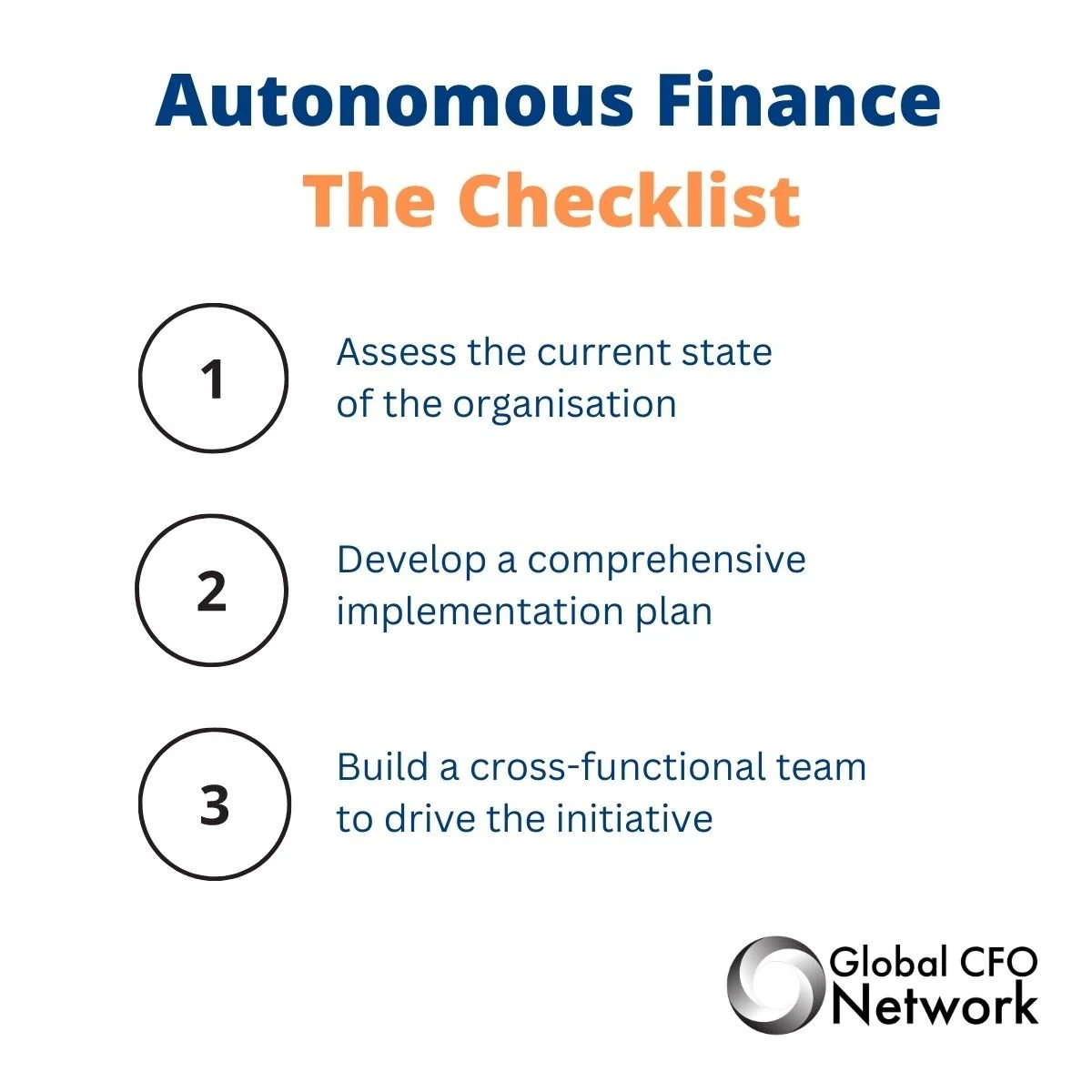Network Guidance
Autonomous Finance: what CFOs should do right now
While autonomous Finance dominates headlines in business media and conversations at the Global CFO Network, progress in adopting AI and automation in the Finance functions of multinationals remains patchy. Autonomous Finance is of huge interest to corporate Finance functions as companies look for ways to improve efficiency, reduce costs and gain a competitive edge, but how much time and money are they willing to invest, and what role should the CFOs of regional subsidiaries play in the identification and deployment of technology?
The benefits
One of the key benefits of autonomous Finance in a large multinational is the ability to automate repetitive and time-consuming tasks, such as data entry and reconciliation, and release staff to drive business performance. This is all the more critical when labour markets for Finance professionals remain tight - you want your team working on the value-add, not the basics. According to a survey by Deloitte, 64% of Finance professionals believe that automation of Finance processes will be crucial in the next three years.
Another benefit of autonomous Finance is the improved efficiency it offers. With the use of AI, financial systems can automatically identify trends and patterns in financial data, providing valuable insights for decision-making. According to a study by Accenture, companies that have implemented AI in their Finance function have seen an increase in operational efficiency of up to 50%.
But what’s particularly exciting is that autonomous Finance also offers the potential for creating new products and services that were not previously possible. For example, using machine learning, companies can predict future demand and adjust pricing accordingly, providing a competitive advantage. Businesses can use natural language processing, for example, to automate the analysis of large amounts of unstructured data, such as customer feedback, to identify key trends and patterns.
It’s no secret that global regulatory and competitive trends haven’t been kind to global companies over the past decade. With multinationals facing tougher regulation on everything from privacy through to taxation, and local competitors often thriving in less-regulated niche markets, autonomous Finance driven by advanced technologies has the potential to be a huge competitive advantage for large companies.
The challenges
Despite the potential benefits of autonomous Finance, it goes without saying that there are also challenges. One of the keyissues is a lack of understanding and expertise in technology within Finance functions. Implementing autonomous Finance requires a certain level of technical knowledge and skills,. Ask yourself now, does my Finance team have those skills? If not, can I develop or hire for them?
CFOs themselves can be a roadblock to autonomous Finance. Which tasks should be automated and should automation be integrated into existing systems and processes? Here are some of the reasons CFOs - usually inadvertently - slow the change process:
Limited understanding of Finance processes: CFOs may face difficulty in identifying tasks that can be automated due to lack of knowledge about the intricacies of Finance processes.
Inadequate visibility into Finance processes: CFOs may find it challenging to identify automation opportunities without having a clear view of the entire process, particularly if the data is spread out across multiple systems (a common state of affairs in many multinationals).
Insufficient technical expertise: CFOs may not have the necessary technical skills to identify tasks that can be automated or how to integrate automation into existing systems.
There is a solution to the CFO roadblock challenge - delegation. Tasking an informed individual or team with spearheading autonomous Finance while the CFO plays a sponsorship or champion role can accelerate change. That way, those who have the knowledge can drive the details, while the CFO clears barriers and manages the top-level change.
Data quality is also a critical issue. For autonomous Finance to work effectively, it needs to be fed with high-quality data that is complete, accurate, and relevant. However, in many multinational companies, data is siloed and spread across different systems, making it difficult to obtain a complete and accurate view of the data.
To overcome these challenges, CFOs and Finance teams must implement a comprehensive data management strategy that includes data governance policies, data quality controls and data validation rules.
Data regulation - both privacy and security - can also be a significant barrier. In multinationals, those barriers are even higher due to internal organisational complexities and legal entities that operate across multiple jurisdictions and regulatory environments.
Three steps to ensure your organisation is ready for autonomous Finance
Assess the current state of the organisation: CFOs should assess their organisation's current Finance processes, systems, and infrastructure to identify areas that can be automated or improved with the use of autonomous Finance. This includes identifying tasks that are repetitive and time-consuming, as well as any pain points or inefficiencies in the current process.
Develop a comprehensive plan: CFOs should develop a comprehensive plan for implementing autonomous Finance, taking into account the organisation's goals, resources, and constraints at both a global and regional level. The plan should include a clear timeline, budget, and resource requirements, as well as a detailed implementation roadmap. The plan should also include a data management strategy that addresses data governance, data quality control, data integration, and data security.
Build a cross-functional team: CFOs should build a cross-functional team to support the implementation of autonomous Finance. The team should include representatives from Finance, IT, and other relevant departments, such as operations, legal, and compliance. The team should be responsible for managing the implementation and ensuring that it stays on track and that it meets the organisation's goals.
If you’re a Finance leader, you can join us, or learn more by contacting one of our offices.


